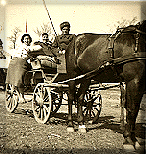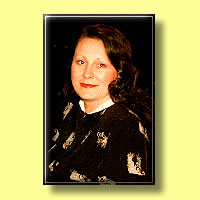

|
|
Hungarian
Refugee - New Australian - Sportsgirl - Wife and Mother - Miner
- Publisher - International Business Woman
|
|
The
following story about Mary Metcalfe is an extract from Alan
Shannon's
"Twentieth Century Profiles" Vol III (1993)
, which features the life stories of high achievers
in the State of Queensland, Australia.
|
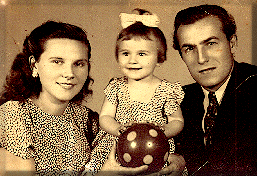 |
| Mammy,
Mary & Laszlo |
The
chances of little Mary Imre escaping from Hungary in November
1956 without being shot by Russian troops were very slim, yet
she shared the determination of her mother and father to reach
the freedom offered by Western Europe.
Mary credits her parents with great bravery in their safe escape
from the Hungarian uprising to Austria and England.
The
small Imre family group were materially poor but spiritually
strong after they escaped from Communist Hungary.
A
year spent in England provided time to learn English and consider
the options for a permanent home.
When
her father fulfilled a long-held ambition to migrate to Australia,
Mary grew and became totally assimilated here.
|
|
She
has grasped with both hands the wonderful opportunities this
country offered.
Working
closely with her husband, Alan Metcalfe, she has become a self
made, successful Australian.
Their
collective business acumen and hard work led them to open up
a number of business ventures in Australia over their 25 years
of marriage, and has culminated in the establishment of an international
telecomputer communications network that they presently conduct
from a base in California, USA. (Dated 1992)
Mary returns regularly to Hungary with ideas and skills that
she hopes will assist her former people to emerge from the grip
of communism.
|
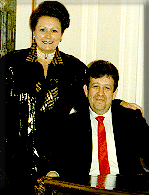
Alan
& Mary Metcalfe
|
|
Born
Maria Ilona Imre in Budapest in July, 1948, Mary Metcalfe was
the only child of Laszlo and Maria [Nagy] Imre who lived in
Pest, the northern Danube bank sector of Budapest. Pest is the
commercial, administrative and industrial sector and Buda the
older residential sector.
"My
Father, Laszlo, served with the Hungarian Air Force on the German
side in World War II. He had been captured by the Russians near
the Austrian border and was fortunate to have escaped whilst
being transported to the terrible prisoner-of-war camps in Russia.
He
walked back to Budapest, where he began his studies as an electrical
engineer and eventually became a foreman in a large state-owned
enterprise there.
|
|
Dad
loved his water sports. He did kayak in summer and played water
polo during winter.
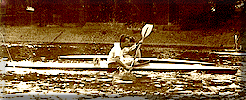
On
summer weekends I can vividly remember going up the Danube to
kayak carnivals and the camping grounds. Dad was a top exponent
of kayak.
|
|
His
twin nephews, George and Steve, who won medals at three Olympic
Games and several world championships in kayaks and dad gave
great encouragement and support to them.
They
were selected but unable to compete at the Melbourne Olympics
in 1956 because of the revolution in Hungary and the fear they
might defect.
My Mother was a member of the historic Nagy family. Her parents
worked on a collective farm near Mosonmagyarovar, a city in
the north-west of the country.
|
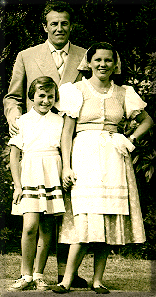 |
|
Laszlo,
Mammy,
& Mary
|
"Life
under the communist regime provided few opportunities or hope
for my family. We were offered the normal enticements of a state-owned
apartment if Dad would join the Communist Party, but the price
was too high for a man who cherished his freedom.
Also my family were Christians, but because of the communist
suppression of religion were banned from attending church. The
family was obliged to keep its religion within the home.
Dad
bought many books and studied the teachings on religion and
philosophy all his life until his death. In Budapest we lived
in a small house owned by Dad's father. When the communists
took over all shops and businesses were state owned and operated.
We didn't have many clothes but I remember that even if we only
had one outfit it was of quality material.
Mum
and Dad would save and make sacrifices for weeks so as to be
able to buy the material to make us the best available suits.
They believed that you might not be wealthy but you could be
rich in spirit! I have followed that concept throughout my life.
No matter how tough times have been I have always dressed my
family well.
|
| "Food
production was depressed and wages very low for the workers of
Hungary. To eke out our meagre rations my Mother and I spent regular
periods with my grandparents in the country near Mosonmagyarovar.
There the farmers were permitted to have their own pigs, poultry
and rabbits for their own sustenance. I well remember the train
trips to and from Mosonmagyarovar and the horse and buggy rides
between the railway station and the farm.
"I
don't remember much about the revolution which took place in
Hungary in November, 1956. A group of university students were
brave enough to rebel against the repression by the communists
and took over a radio station. The Russians reacted by sending
in the army. We listened to the radio for news of the students.
My cousin, who was one of them, was shot five times. I was among
the children who lined the streets to see the Russian tanks
roll into Budapest. We received gifts of chocolates from Russian
soldiers marching besides the tanks. One soldier who spoke Hungarian
said they were sorry to be in our country but would have been
shot if they had refused. This made me realise that wars are
not created by the ordinary people but by the system and its
leaders!
"In
a country where everybody was expected to be a member of the
Communist Party my family refused to take the easy way out.
Although asked regularly to join the party my Father had never
joined, preferring to be bypassed for promotion rather than
accept a doctrine he didn't believe in. Dad was a seeker after
the truth and found the communist interference with the freedom
of the individual repulsive to him. He believed that God gives
every man the right to follow his spirit in truth and choose
how and where he wishes to live.
"Dad
always wanted to go to Australia. Having read the 'Sunburnt
Country' he saw it as a land of opportunity and sunshine and
he had made me love it before I even saw it! Mother and he had
wanted to migrate there in 1947 but they couldn't organise the
papers. Later the Russians were advertising for men for the
Aswan Dam project. Although the pay was good and Mother would
have let him go, Dad believed that neither position nor money
would take the place of a close family unit. Of course we now
know that if we had gone there we would never have come to Australia.
The freedom was very appealing to those in communist Hungary.
God gives most people the choice of how they live their lives
but the communists denied that right!
"When
the 1956 revolution took place my Father was directed as paymaster
to stop paying wages to the workers at his factory. He took
a strong objection to this decree and went ahead and gave the
men and women their pays even though he didn't collect his own
wages. In so doing he became a wanted man by the communist regime
and knew then that he had to get his wife and daughter out of
Hungary quickly.
We nearly left our flight too late because Dad kept hoping the
revolution would bring about reforms or international intervention,
neither of which eventuated."
By the time the little Imre family decided to flee the Russians
had closed the border with Austria by building armed camps along
the border. It had been snowing quite heavily and the ground
was very wet. When Laszlo Imre made up his mind that they had
to escape their desperation led them to leave behind their possessions,
carrying only a small bag and a blanket. Their Hungarian currency
units were of no value in Austria and the anti-communist world.
Because of Mary and her mother's previous regular visits their
train journey to Mosonmagyarovar was uneventful.
"My
grandparents' farm was fifty kilometres from the border with
Austria and it was known that the Austrian authorities had been
providing asylum for the thousands of refugees who'd been escaping
Hungary. We had first to clear the railway station to get to
the farm. Mother knew that the passport which every citizen
carried was stamped for every rail journey on disembarking.
She and I had in the past established a pattern of regular visits
but my Father's passport did not show that pattern.
|
|
"As
a result, when we arrived at Mosonmagyarovar my Mother's passport
and mine were stamped but the Russian guards seized my Father.
Two
Russian soldiers were taking him to be locked up when my Mother
showed great bravery and audacity in grabbing a large bundle
of passports from the officer's hands, finding my Father's and
saying there it is, see for yourself! In the resulting confusion
she took Dad's arm and said 'Come on, let us go!'
The
three of us walked away from the scene expecting to be gunned
down from behind. In the distance we could see my grandparents
coming to get us in the horse cart. We got in and were driven
away.
|
|
|
This
was a vivid experience for an eight year old though I was probably
too young to experience fear. My parents were very shaken by
the experience.
"That
afternoon we prepared to walk to the Austrian border. Grandfather
and Dad had determined that if we walked all night we would
reach there before daylight. Grandfather showed us our guiding
star to follow and told us not to deviate from that course on
any account. We started out with fifteen other Hungarians who
were like us seeking to escape. There had been a snow thaw and
all night we struggled along through a sea of mud. On a number
of occasions during that night we were shot at by the Russians
and were forced to dive flat in the mud. We presumed that some
of the starting party were shot and some deviated from the star.
The Russians fired flare shells which lit up the country so
that they could see and shoot us. The most fearsome occasion
was when we were travelling through a dead cornfield and we
were attacked. The noise we made as we ran and zig zagged would,
I feared, be sure to attract their fire, but we got through
that and the other occasions when we were forced to deviate
around tents occupied by Russian soldiers.
"Our
little party had dwindled to five people. A Jewish man was unable
to keep his shoes on in the mud and slush and we left him at
a railway siding to an unknown fate. His daughter, a healthy
young girl, demanded that Dad carry her but he said 'No way,
if his eight-year old could walk so could she!' We never did
find out what happened to those two. As we neared the Austrian
border we deviated around numerous tents occupied by Russian
troops. Dad kept leading us towards the star and he insisted
we both hold on to his hands. After midnight we came upon a
tent with what appeared to be soldiers in long woollen underwear
walking about. Nearby was a haystack where Dad left us to rest
in our blanket. He moved in close enough to hear that the voices
were Hungarian. You can imagine our delight when he came back
with a huge grin to tell us we were in Austria and free!
"These
people were refugees like us, warming themselves in front of
a fire. What a sight we must have been covered in mud from head
to foot! The International Red Cross took us in, bathed us and
decked us out in similar long woollen underwear. They fed us
and gave us a bed made of hay with a blanket thrown over it.
We were put on a train which took us across Europe and through
Dover to England. Along the way at every stop there were people
who'd heard of our plight and brought along small gifts of fruit
and other food. I well remember my first banana given me by
a German family and believe it was a good omen for my coming
to Queensland. At a village called Winslow near Manchester the
Red Cross had taken over a large country house, formerly a girls'
school, which was to be our home for the next eighteen months.
"I
had started school at the infants' school in Pest and initially
at Winslow the refugee Hungarian children were all taught together.
We were all very keen to learn English so it was welcomed when
the authorities decided we should attend the public school in
Winslow.
Although the first few months were difficult because of the
language problem we learned to speak and read English and it
was a lot better for US all. My parents did not have the same
opportunity for schooling though.
|
|
My
father had leadership qualities and was put in charge of the
catering for the refugees. The Winslow Hostel was set in a beautiful
parkland with a church and school nearby. "We had left Hungary
with nothing but the clothes we stood in and all of us were
keen to make a start towards a new life.
In Hungary mother had never worked, but she was the first to
get a job in a nearby home where she did domestic duties and
made good friends with the family who employed her. The Red
Cross home had instituted a system where five pounds of pocket
money was handed out each week to the adults and those who had
outside jobs missed out, but Mother wanted to earn money to
send food parcels to her family remaining in Hungary. She was
allowed to receive both because she was the first to get out
and show initiative to work.
When the time came to leave the Red Cross home the British offered
incentives for us to stay in England. lead was offered a very
good job with a free home and six months food. The Canadians
and Americans offered us migration, but my parents said they
wanted to migrate to Australia. This had been my Father's dream
for many years. That was the star he wanted to follow!
See
Part II - Coming to Australia,
Click
here.

|
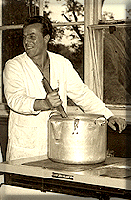
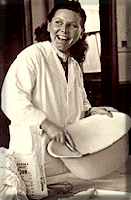
|
|
FOOTNOTE:
Today Mary and Alan live in Brisbane, Australia where they are
developing Alpha Info Business Servers, which is a development
of the international communications network they began building
in 1990. Mary is the director responsible for Customer Relations
and Sales for HarpBBT and AlphaInfo.
|
|





